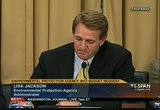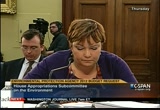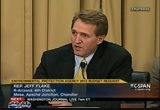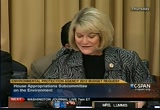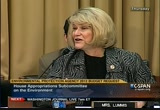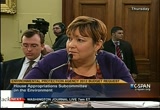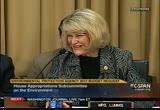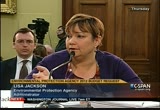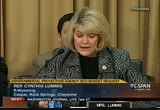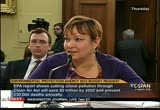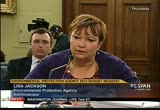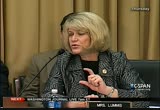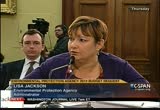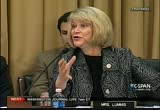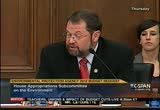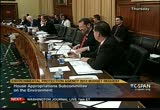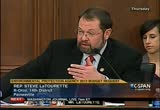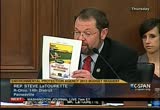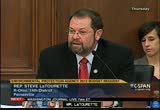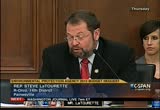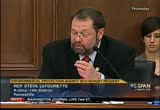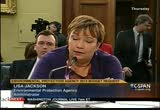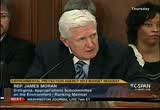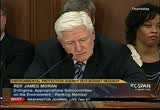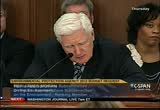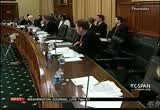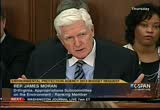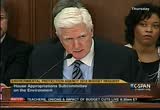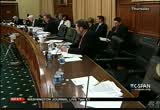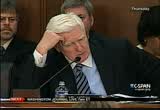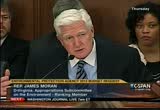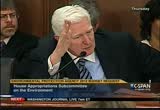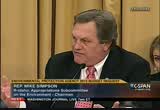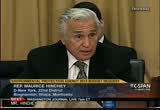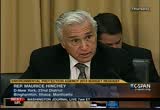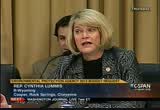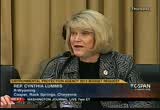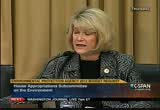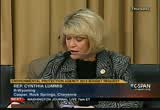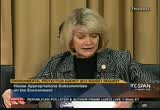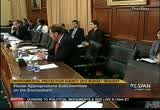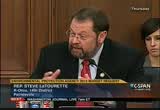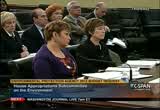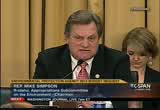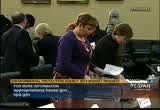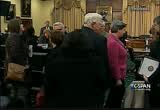tv C-SPAN Weekend CSPAN March 6, 2011 6:00am-7:00am EST
6:00 am
as soon as the rule becomes final, it will be quite clear. >> >> let me move to arizona. you talked about this before. it is because i understand the clean-air scientific advisory committee has recommended that the standard be lowered or raise -- battered -- bettered, i guess it's a. it is that -- is that why they have moved ahead? >> his equally -- i do not have the exact quote -- it is equally possible to retain the current standard or to lower it. as far as i know, they have not made a determination our recommendation to lower the
6:01 am
standard to epa. >> we know that they have made recommendation and it is safe to say that epa tries to are often follows recommendations of that scientific advisory committee. >> we are required by law to consult with them. there is only one case where we did not follow the recommendation. that would be ozone standards promulgated at the end of the bush administration. >> the clean it -- that clean- air advisory supervisory board, they recommended a new standard of my understanding is that the epa rejected the recommendation. >> my understanding is that they said their recommendation was that they supported either retaining or revising. they did not take the position. i will make sure and get you the
6:02 am
exact language. >> the concern would be that the epa is falling one recommendation and not the other. the one recommendation would impose considerable costs, and when the other recommendation made my spares the cities and municipalities that cost. -- might spare the cities and municipalities that cost. my concern might be that the epa would be picking and choosing which recommendation to follow and only following those that impose significant costs. the problem is been that we have been through this again and again, every time the epa says that they change the standard, there has already been lawsuits and actions in forcing -- forcing cities and counties to take action to reach a new standard. while they are in the middle of complying with this, here comes epa again saying you may have a new standard. it would behoove all of us to
6:03 am
say that we could have a 10-year standard in here of the benchmarks. instead of putting the cities and counties for this wringer every couple of years that they find very difficult to comply with. and that is my concern on that. i will wait for the next round for the others. >> this lummis. >> thank you, mr. chairman. i do not have much of a voice today so thank you for your tolerance. i like to associate myself with -- toemarks that mr. ko disassociate myself with the remark of cole. i never hear the vitriol that i here in town hall meetings about epa, from coal miners to ranchers to people who do believe climates are changing but believe that the epa's heavy hand forces regulation of
6:04 am
greenhouse gases, sending jobs and to countries that do not have environmental regulations that match ours. thereby causing greater pollution elsewhere in the world that will eventually get to us as well. most of us have more confidence in our own country's ability to manage environmental issues with the latest technology and is capable elsewhere in the world. i think that we should concentrate on trying to keep jobs and technology in the united states where we can actually be the leader in those areas and export those technologies elsewhere in the world. so please do heed carefully mr.
6:05 am
remarks. i have some questions, a son that i will submit in writing. [unintelligible] under the clean air act or the clean water act? >> i do not have the exact number in front of me. we classifier regulations according to their economic significance. over the course of the year, are you asking about this year? ok, i think that we have two or three economically significant requirements, maybe four, under the clean air act in our regulatory calendar. >> are you complying with president obama's january 18 executive order that requires agencies to take into account -- and this is among other things -- the cost of cumulative
6:06 am
regulation? >> yes, ma'am. >> and do have some data that you can share on that? >> we have been asked to look back -- a retroactive look back on regulations to determine impact. and we have begun that process but i do not have anything to share at this time. i cannot give you a date today, but we will get you a date. >> and could you ask -- >> we will give you a date when we will have information. >> what criteria do you use when a regulatory change must follow the open rule making process, or when guidance will suffice? i can tell you, we hear a lot of concerns that guidance has broadened the scope of the clean water act in ways that skirt the
6:07 am
rulemaking process. >> we all the administrative procedure act in determining what should be -- we followed the administrative procedure act to determine what should be followed. usually, a very long and detailed process. we're very proud of the fact of we have a very transparent rule making process. their places were epa must offer guidance and clarification and does not rise to the level overruled. increasingly guidance is subject to public comment as well. you perhaps heard earlier in the discussion about the mountaintop removal and surface mining. >> i want to follow up on a conversation on a hydraulic fracturing. it occurs predominantly in my
6:08 am
state. there is frequent revisiting of the hydraulic tracking issue. and modern techniques. i would also point out to those that have concerns about it, especially those concerned about the "new york times" article that the former director of the environmental quality and the former governor submitted a rebuttal to the "new york times" that they would not print because it was too long. it addressed many of the concerns that were raised in the article. and of course, the article was not. -reviewed scientific expression -- was not a peer-reviewed
6:09 am
scientific expression of hydraulic fracking. and following up on that, using that as a sad way, can you tell me, what does the epa do that states are incapable of doing through their own departments of environmental quality? >> as you know, water moves between states and air moves between states and countries. epa's most important role over history, it often helps states to set up their programs. now we move more into a role where we oversee programs to ensure the clean water act is implemented the same way across the country. we have made tremendous progress in where we have work to do. there are a lot of regional issues.
6:10 am
the transportation of pollution from the west to the east, or wallet. water quality issues that are regional and require the cooperation of several states. epa has a very full some research budget. most aids cannot afford that. we did not have money to put into research that we would like in the states. i am always amazed wherever i go when every slide with environmental changes is associated with epa. the states are extremely important in the day-to-day implementation of our environmental laws. they enforce the law. but the epa's role is one of oversight as well as scientific knowledge and working on
6:11 am
regional issues. >> to you believe that research is your highest priority? >> our mission is the protection of public health and environment. i would not call it our highest priority, but they are increasingly so complex that we need very good science. so we spend a lot of money and that a significant portion of our budget on science issues, whether applied research or in grants to do research. >> do you look at what states can do verses what they cannot do or what you believe they are incapable of doing? and prioritize for the epa to do those things that you believe the states are incapable of doing as well, as epa is capable of doing it? >> we have seven priorities i
6:12 am
established at epa. one is working in partnership with states and tribes. many of my managers including myself come from state government and know very well that there is a synergy -- the synergistic relationship. and quite frankly, when we do not agree and a lot carved out a role in epa in the implementation of environmental laws that we must uphold. we are ultimately accountable for the implementation of those laws. >> there are tribal groups that formed commissions such as grand canyon, the transport commission. that may not be the name of it, but it was western governors, the tribes nearest the grand canyon, and others who worked diligently to get it to address the quality issues in the area around the grand canyon. i know that similar agency
6:13 am
efforts around the country -- do you look to those as a primary driver? or do you look more to the federal government as the primary driver? >> those groups, if they are the ones that i think about, are not authorized under the clean air act. these are regional problems, visibility is original problem. there are several regional groups that protect their visibility around the country. they are authorized under lock and we were very closely with them. >> as president obama became president, it looks to me in terms of percentages of increases, the epa has had the highest increase in this budget. do you agree? >> we have received the highest increase of any epa budget under president obama in fiscal year
6:14 am
2010. >> i understand, it was around 39%. paprikas administration's budget, -- from the previous administration's budget, and it was a 24% increase over previous epa budget. do you agree with me there? >> topline, yes. dealing withll about 25% increase over previous administrations. >> the very vast majority of that money going out to the states. to the great lakes, or for water and waste water into structured brands. the president thought investing in water and wastewater into structure was important. he did have to get some of that back reluctantly. we have to make those tough choices. >> among those, or their revolving funds ?
6:15 am
>> that is what i was referring to. >> you are being very generous. i will yield back. i do want to pursue that. >> the gentleman from atlanta. >> thank you, and i want to thank you for that courtesy did you extended to me personally to my constituents. also on the issue of the great lakes, i want to commend the president and you for the emphasis placed on the great lakes. i am sorry that the distinguished ranking member of the full committee is not here anymore, but i think he was engaging in revisionist history with this administration, the very first to put real money behind the great lakes cleanup initiative. we limped along at $50 million here and $50 million there. the original vision of $475 million would actually let us move forward in a lot of important areas.
6:16 am
if the gentleman from washington would like, we can send him busy for carp and perhaps again repopulate some of his areas. [inaudible] what can you do with it? >> what i would say to the distinguished ranking member is then we will bring him one, and maybe we will check it out. they are tough to fillet. about 6 feet long. >> some of them grow 100 pounds. i hope that it is good eating. there are a couple of things of concern to me that i would like to get through. one is something that ms. kaptur and i sent you a letter on and it was at draft notice, and you were kind enough -- it was mr. owens, the assistant administrator.
6:17 am
it has to do with false or misleading product names. here is my concern. there are two companies in ohio, scott is pretty well known, and the other i did not know about until this dustups started, and this is anderson golf pro. the proposed pr notice, which will not go through guidance -- rule making, it will be guidance. it was to take a look at trademarked names. have a lot of problems with that. a trademark name is a trademark name. but the comments being solicited on names that apparently the agency will have problems with predicator, germ shield, professional grade, pro, say, safer, safest, and green.
6:18 am
when i was growing up, green was a color. if someone has gone through the process of having its fertilizer trademark, i have no problem with the epa looking in the bag to make sure it is safe for human help and everything else. but a lot of time and money, some of the trade mart names have been around since the 1960's. seets lawn pro i don't anything deceptive in this name. i do have trouble with the epa proposing without the rule making process to move forward with a guidance that was say that the word pro is inappropriate. in the andersen company, they make the problem -- a product called golf pro. they have been advised because it can be used on your front lawn and not just on a golf course, that they have trouble
6:19 am
with the word golf as deceptive. they will be able the college andersons, because they cannot call at andersen's gulfport andersen's perot. olf or andersen's pro. the one scots product that i use is miracle gro. how the heck can establish that a miracle has occurred? you will have all of these little old ladies sending their to make is too prone to present to the college of cardinals to determine whether a miracle has occurred. dealing with trade marks and the fact that they had been in place for a long time, i could argue is is an
6:20 am
unconstitutional taking of property without due process of law. but because i find your reasonable person, maybe we could pull back the people they want to take the word and -- out of thero trademarks. and put it through the rule making process and not guidance. a letter in january indicates that that is not the position of the agency but that is my request. did you take a look at this and if you want to really get into what lawn care products are called, they go to the rule making process. not to solicit comments from people, but also was the speaker or to let the congress way and make some suggestions. that was request #1. request #2 has to do with fly ash. there was an amendment during the cr, mr. mckinley offered the
6:21 am
amendment to deny funding to the epa relative to declare a coal ash to be a hazardous material. i think that amendment passed. regardless of that amendment and i am not a big fan of amendments limiting funding, but the history of fly ash is that there was a series of studies that the agency actually presented a recommendation to congreve's coal ash should not be regulated as a hazardous material. and now without consultation with the congress, it appears that the epa is about to do 183 degree turn. why would congress direct the epa to make a recommendation only have the epa go in the other direction? and then, two, the people that engage in waste tell me that if
6:22 am
you increase the amount of fly ash that needs to be treated as hazardous material, it will be about 50 million tons a year, which will tell of our land area in a couple of years. your comments on miracle gro and fly ash are appreciated. >> i believe in miracles. >> i do, too. >> i will take a look it that. on the subject of coal as, epa continues to support the beneficial use of that material. we have proposed a rule and the rule did not make widget they were different approaches and we took comments on it. to regulated under subtitle d, hazard as provisions of the law, or subtitle d, the solid-
6:23 am
waste provisions. either way, it increased regulation which i think is warranted. there is potential public health and environmental issues. all of this in the aftermath of the fed your -- the failure in kingston, tennessee. we received over 450,000 comments on this proposal. that will take quite a bit of time to work through. we remain committed to rulemaking on this matter. that willing to analyze information and make the final decision based on comments, science, and the law. but we will not do that this calendar year. it should take quite a bit of time. >> i understood that you came up with three different proposals to have comments on, and -- including d prime. the only concern i have, if you look at the tennessee incident,
6:24 am
obviously seriously, it appears as a matter of engineering and studying the dams and things of that nature. but it just recasts lead -- just to reclassify fly ash, i hope that you reach a conclusion that if that is a direction you go and, at least consult with the united states congress before moving in that direction. >> thank you. >> mr. moran. >> i hope that is not your alexandria line where you use all that fertilizers that. nothing but natural green products go on my property in virginia. i hope that is the case. we get some of the people using the stuff that it is getting into our water supply and we have to spend taxpayer money to
6:25 am
clean it. we have been trying to find our neighbors who are accountable for that. maybe we have found the problem. anyway, that is not what i want to focus on here. i would like to thank you for raising it. will send the lawn police after you. greenhouse gases -- we have heard from -- so much from so many people on how aggressive you have been on greenhouse gases. fired got this old cold- plant in alexandria that is redundant, and we still not -- still cannot get it closed down. some of us would like more aggressive action. i know how deferentially you want to speak to the industry and you want to make sure everything is done right. but there is a bucket -- another point of view from the one express, but -- from the one
6:26 am
expressed. during the consideration of the cr, mr. cole, the author of the amendment to stop epa regulation of greenhouse gases, said, "this will rein in epa and prevent them from implementing the so- called cap and trade monstrosity on states like texas." i did not know that bp was trying to implement cap and trade. to the greenhouse gas regulations that epa implemented in december institute cap and trade without congressional action? >> no, we have taken no steps to establish a cap and trade program and we do not intend to do so. i join with the president in calling for legislation in the absence of that. >> without congressional action, you will not be acting on that.
6:27 am
thank you, miss jackson. we heard from mr. barton, the ranking member on the commerce committee, that carbon dioxide is not a pollutant under the definition of the clean air act. so epa has no authority to regulate that. is that true? >> no, sir, that is untrue. >> just so all the members are clear, what have you done in the greenhouse gas regulations and have you seen them going out of business as a result of your actions? >> no, sir, we have actually see activity that would be encouraging. we had about 100 applications now in process. these are clean air act permit applications that are needed before either undertaking a new facility or a significant modification that would raise the amount of greenhouse gases
6:28 am
quite significantly. 25 of those 100 have already done their analysis, the greenhouse gas emissions, and that is before -- but for the permit writers, and two have already received their permits. one in california. >> on clean waters, this new bill, h.r. 1, because you guys dump everything imaginable did you could into it so that we're having trouble getting it passed. it contains language that prohibits epa from updating its role and guidance on the definition of water under the clean water act. there are two supreme court decisions, one in 2001 and the other in 2006, that have created
6:29 am
some confusion and uncertainty over the scope of the clean water act. but the prohibition in h.r. 1 is an anti-real estate and anti- business, given the position of groups that they do supporter rulemaking process that would provide all sides with clarification, with ample opportunity to participate in the regulatory process. i ask you, madam administration, how with the prohibition dumped onto h.r. 1 impact the permit process and epa's future acts on limiting water pollution? >> i believe that it would be -- it would prevent epa and the court from offering clarifications to comment riders. -- comment writers. that level of confusion is
6:30 am
having a real world impact on enforcement. i believe there will have an impact on water quality, if not addressed. if we are prohibited from making any clarification possible, it will have an impact on our ability to develop and invest money as we try to create jobs. >> that is what i was concerned about. we're trying to in kurds this economy and people who have plans worked out with a locality, and number of smart growth ideas in metropolitan areas, we're being told we cannot move until we get clarification on the clean water act. they are asking you to do it and they are stopped because of h.r. 1. one last question with regards to h.r. 1. this is section 1746, it would fund the government for the remainder of the fiscal year, but it would stop epa from limiting greenhouse gas
6:31 am
emissions. what is less clear is the impact of section 1746 on renewable fuel. i want to ask you, it is the language included and shall i use that dump truck of the bill known as h.r. 1, i could use -- it had more poison pills than bututin's medicine cabinet, here we are burdened with all of this stuff, and we have this language and h.r. 1 that stops epa posset renewable fuel standards for the remainder of the fiscal year. how you deal with the impact of the consequences of section 1746 in h.r. 1, madam minister? >> we agreed that the greenhouse
6:32 am
gas prohibitions and others have the courage to have an impact on our ability to do this. this is based on a life cycle analysis with respect to greenhouse gases compared to traditional gasoline. this is one of the consequences as well. >> well, i had just one final comment to address. we talked a lot about the great lakes restoration. i happen to agree -- we ought to be investing money because it has immediate economic impact and the deleterious one if we do not make that, but it is right with regard to puget sound, affecting the water all the way down river. and chesapeake bay. on chesapeake bay, we had support on both sides of the aisle, but now we have this language that says you cannot use any federal funds, even
6:33 am
though we have had the ag department and a number of agencies working collaborative flee with the states and the localities to clean the chesapeake bay. we have miles of dead zones from all of the fertilizer, as mr. latourette reference, they are killing the vegetation at the bottom of the water. and now we have this legislation that says you cannot use any federal funds to implementing this, which is precisely the tool that we are using to try to clean up the bay. any further comments, that is fine. otherwise, i will let you go. i appreciate the opportunity to make these points, mr. chairman. i trust that you would agree, we ought to get back to a regular bill so that we can deal with these very difficult regulatory and legislative issues and an appropriate document and not in that dump truck of a bill known as h.r. 1. >> i appreciate the gentleman's
6:34 am
comments. but funding limitation amendments are appropriate and appropriations amendment, because we are in an appropriations command and -- committee. i would also say that you are incorrect, 16 -- section 1476, that was stationary sources of greenhouse gases. it had nothing to do with fuel standards. it would let those completely untouched. everyone throws out this, the world is going to fall, we cannot do anything. when it was proposed, the energy star standard, we could not do that anymore. that program existed before there was a mention of greenhouse gases. there was nothing they would have affected energy star. yet all those comments were made and people that do not like it throughout the worst-case scenario. i'm surprised that the world did not fall apart the day after that passed. unfortunately, i guess it did not. maybe those things that were set are not true. it seems like the agency -- i understand.
6:35 am
i am smart enough to understand the agency on almost anything it does overstates the benefit and understates the cost. i also understand that businesses that do not like it overstate the cost and understate the benefit. the reality is in the middle. the honest -- it is hard to have an honest discussion because of all the bowl from now. >> i agree that you are a very small -- smart guy. but i think you would also agree that we should not be deciding these issues with 10 minutes of debate, for example, at the chesapeake bay, it did not mention epa, it said all federal funds. and that is the problem with legislating at 2:00 a.m. in the morning. >> to clarify that, you will notice that on the greenhouse gas regulation or limitation put in there, we only did it through the cr. we did not want the epa and business to spend a ton of money
6:36 am
implementing a role that was being taken up by the authorizing committee. the one thing i do not want to do is have this committee substitute its judgment for the authorizing committee. working with them, today term of the sea are, that is fine. -- during the term of this cr, they said it would be fine. but let this committee do its work. there things that have to be done on an appropriations bill. there are a lot of statutes out there that are unauthorized. they have expired. what do we do? we extend the authorization through the appropriations bill. if you want to stop to that, we will see -- we will close down the health clinics around the world. >> i do not want to be argumentative. you are a good guy and you want to do the right thing. i do think that we have a real problem with all of those writers put on to that continuing resolution. thank you.
6:37 am
>> that were so devastating that no efforts were made by your side to remove them. >> i have one brief question. it is about the most recent article in the "times," coming up today or tomorrow. according to reports, they say some epa lawyers believe that federal pollution laws are being violated in pennsylvania. i know you are going up there tomorrow and you will get some deep insight into this whole situation and nine appreciate your spending the time up there. they believe that the pollution laws are being violated and specifically drilling waste is being discharged into rivers and streams with minimal treatment. according to one epa lawyer that was cited in this most recent story in the "times," this is a " son, "treatment plants are not
6:38 am
a lot under federal law to process mystery liquids regardless of what the state tells them. mystery liquids is exactly what this waste is, since its and -- since its toxins are not known. that was an interesting statement by him. the agency has not intervened in pennsylvania. most people found resistance from upper level staff in the epa regional office of number three, and they oversee the operations of the state. that might be something you would be interested in checking out when going up there. i think we would be interested -- maybe you know something about this already, the disagreement in region 3, what is going on there? how this disagreement is taking place, what the context are, maybe you will find out about this and look into this tomorrow.
6:39 am
enforcement officers there believe the law is being violated. you have some enforcement officers who believe that this lot is being violated. i wonder if you can give us some insight into why no action has been taken, despite calls to do so from the enforcement personnel? >> i will be in a better position after speaking directly to my staff to more. what i was -- what i want to wish her is those things that i've said publicly, if we do a study, we will base our work on science, but at any time we find a situation that we believe violates the law, we need to be clear and to either work with the state as the primary enforcer to take action, or to address it. one other thing -- when it comes to the water that comes back up and potentially goes into a treatment plant or surface water, that is regulated. that is absolutely regulated under the clean water act.
6:40 am
that is waste water when it comes back up. some places that we injected, the college recycling, -- that reinject it, they call their recycling. but one of the things that is important, as an agency we ensure that new york -- new york has made clear to me -- the new york office has made clear to new york state that we can set additional standards for pre-treatment. i need to speak to the professionals out in the philadelphia office to make sure that they hurt from the top of this organization -- that they hear from the top of this organization that we need to do our job. when a state is doing the work, we are not there to poke them, but to ensure that we are providing information. i am happy to report back.
6:41 am
>> administrator jackson, i want to thank you for everything you're doing and what you have done here today. i appreciate you going up to pennsylvania. >> thank you. miss lewis. >> thank you, mr. chairman. again, i apologize for the boys. -- for the voice. i had a good experience with the epa a number of years ago with regard to our request that they work with my state on a compliance issue right next to my land, by next to an oil refinery. i am not sure that we ever would have got it solved without the epa. i want you to know, i am not a person who is anti-epa.
6:42 am
i have seen it work, and a cleanup occurred that i do not believe what had happened but for the epa. please do not view me as a detractor. but i do have some questions about the efforts to prioritize funding that i believe mayb be detracting from efforts on the ground, boots on the ground, dollars that the epa to really help businesses comply and communities comply with epa regulations. this first question is about rural water systems. does your fiscal year 2012 budget set aside money to assist small rural water systems remain in compliance? >> only within the funding for
6:43 am
the revolving funds, there is money for rural systems, and that is added to the money from the usda, who spends a lot of rural development money as well. >> i will let you know -- i will submit some of these in writing, because i am hard to track today. 200 senators and representatives asked for technical assistance and training grants to small water systems. i believe the epa has chosen under your leadership to go a different route. i am going to right with you and work with you to encourage -- to encourage you to revisit what seems to be working well in wyoming with regard to training grants for small water systems. the small communities do not have the expertise. you were in pennsylvania, correct? there may be some communities in new jersey that are small enough
6:44 am
-- you know what i am talking about. they're really struggle to comply and they want to provide clean water to their water users. but that really does seem to go along way. we will talk further about that. another question i have is about -- has epa conducted or as foreign impact -- as foreign impact study on a specific situation? >> yes, the toxic ruled for utility, it is not out, but it will include the benefits analysis that will include in its proposal at jobs analysis as well. that is not yet out for public comment. >> do you know when that is coming?
6:45 am
>> it is required by court order march 16. >> you anticipate making that deadline? >> yes. >> did your agency consult with the fda on that? >> as proposed by law. >> could you provide those comments? >> we will provide them, absolutely. >> i would be most interested. i have some other questions, mr. chairman, but my voice is not cooperating. i will submit them in writing and i do want to thank you very much, miss jackson, for being here today. >> and i do want to complement -- i have visited your state two years ago, and your drinking water program is wonderful. water is obviously of high commodity there.
6:46 am
>> i served on the board of land commissioners and others which administered the drinkwater which a drinking water and the clean water act. mr. chairman, those programs in my state are hugely helpful at making safe drinking water available around the state of wyoming. it is a great program. >> mr. latourette. >> thank you, mr. chairman. i'm all that stands between you and freedom. i will attempt to be -- 0. >> another miracle. >> mr. moran states -- >> i am glad the distinguished ranking member is still here. i do not like -- i let him make -- call h.r. 1 a dump truck. i do not think it was. it was a majority party that did not produce a budget, no
6:47 am
appropriations bills of any significance, and then in regular order. in h.r. 1 i think you saw pent- up frustration. we had more votes in h.r. 1 then we had in the entire year of 2010. last year, nancy pelosi was speaker of the house. and we did not have any open rules. i do not want to embarrass mr. lummis, but she did not know what an open role was. i think it is a sin that someone who has been here for two years did not know what an open rule was. a lot of things got piled onto h.r. 1, but it was quite true years of frustration on both sides of the aisle. if it was a dump truck, it was the decision by the previous majority to not in this business and dumped this thing in our laps with an expiration date of march the fourth.
6:48 am
it was no accident. the former chairman of this committee knew exactly what he was doing. and that was a dump truck. the question that i have for you, and i think it comes from -- hinchey's recommendation observation, the epa structure hasn't had quarter and 10 -- has a headquarters and in 10 regional offices. we all appreciate flexibility and regional nuances, but one of the things that you see -- it is a lot like the difference between appellate district and the united states district court system, were you have all of these conflicting interpretations -- where you have all of these conflicting interpretations. some uniformity across the country when it comes to enforcement and regulation would be welcome. you should not have one set of rules for mr. hinchey in pennsylvania, and another set of
6:49 am
rules for ohio and illinois. i was just interested to see whether you think there is the various between regions in how different is a wetland in ohio from one being interpreted by the regional office in wyoming, and what are you doing to show that the agency speaks with one voice? >> our goal is consistent enforcement and a level playing field across the country. our challenge in meeting that goal is that oftentimes the vast majority, if not all, of the enforcement action is taken or undertaken by the states. epa plays a dual role. we try to do them both well. a working partnership on training or technical assistance or inculturation of the law, and also in the oversight for states that might
6:50 am
for whatever reason might not be inclined to implement the clean water act and clean air act. those are tough discusses, and the regional offices are on the front line of trying to maintain those relationships over many elections. those relationships are long standing. i work for almost 13 years in our office in new york city. i have a very strong belief and respect for the hard work of the on the ground work with the states. usually those relationships are very good ones. i believe we play both of those role and have challenges. we tried to give national enforcement priorities, because we can enforce rigid we have so many laws and so many are important. you try to go where the public health threats are the greatest. we hope we succeed.
6:51 am
we constantly try to improve. there is money in the budget for an initiative based on transparency of information. what we find is that communities and states know what is going to be admitted into their air and water. if you can get people information about what is in their drinking water, they will do a lot of work force. no one wants contaminated water. that is regaining ground. it's based first and foremost on using electronic information, reporting data, and getting that out to the public. >> i appreciate your efforts in that. some of the disconnect when mr. cole talks about people getting upset and miss lummis speaks about the same thing -- you have the east coast, where they paid all their wetlands and even all their endangered species, and they're trying to impose
6:52 am
standards on us. people runs that -- are upset and we're looking for evenhandedness. we trust you to do that. >> thank you, administrator jackson. you have been gracious to spend three hours with us this morning. perhaps many concerns that you can tell that many members of congress have, we hear these from our constituents and a couple of budget issues as well. i have a whole list of questions that go from everything that i will be submitting for the wreckage. again, some of them deal with the budget. there are other issues that the epa deals with. i do want to sit down with you, now right now, but i will come down to your offices or up to mind, but i like to talk about how you come up with a cost- benefit analysis on the regulations. what goes into it, who makes those determinations -- those types of things. we've talked many times about
6:53 am
the arsenical role and what it does to small communities trying to comply with this, sometimes when they're trying to reduce arsenic levels down to 10 parts per billion, and the incredible cost of getting that last two parts per billion down, do you take into consideration the fact that the city council sitting here, a town of 700 people, they have to decide that their volunteer fire department is going to use buckets instead of the fire equipment because they cannot afford it. that affects human life also. they can no longer have their police officer because they have to comply with these standards. that affects human life also. do those considerations come into consideration because of the imposition of some of these rules having on them. the same is true of businesses.
6:54 am
they have to make a trade-off decisions as they comply with rules and regulations that are coming down. i do want to thank you for being here. i want to associate myself with the words that mr. cole addict -- the concerns being expressed are real. you go back out and as the american people, do you want clean air and water? everyone wants clean air and clean water. we have differences of opinion about the impacts of some of the regulation and how we get there, and the costs of some of those regulations. it is not a matter of they are in favor of clean water and we are not. it is trying to achieve a common goal. maybe the best description of all the concern out there that i have heard, and i have mentioned it to you before, whenever i go to a meeting, i do not care whether it is local city calcimine or chambers of commerce, whoever, once the word
6:55 am
epa comes up, that is the rest of the discussion. that is the concern being expressed out there. when i talk about funding and reducing funding that we had to do in h.r. 1 and what we will have to do in the 2012 budget to get our budget back in balance, some will say to fund the epa. it is the only applause line in this whole thing. that is the kind of concern that the american people have. they do not feel that the epa is working in concert with them to clean up air and water. they feel that the epa is imposing on them, and sometimes for limited benefit. if we do not change that attitude around, i fear that the epa will have more difficulty trying to do its job. one person described it to me as -- if you look at some regulatory agencies, and they use than nuclear regulatory commission, they set a standard, and in business will
6:56 am
come into them and say, ok, this is how we think we can meet the standard. they do not impose how to meet the standard. they set the standard and let businesses develop plans and they will discuss, this will do it, no, this one not. the epa is different. the epa sets the standard and tells you exactly what to do to meet the standard and it prevents innovation and development of new technology and new ideas on how to meet new standards out in the real world. that is a difference in attitude. i want to work with you to try to hopefully solve some of the problems and hopefully address some of the concerns that i think the vast majority of the american people have about the way the epa is moving and addressing some of the concerns that we have. i appreciate it. thank you for being here. it has been a long time, and three hours sitting there is not
6:57 am
6:58 am
>> on monday, henry waxman talks about his opposition to a pending house bill that would strip the epa's authority to regulate greenhouse gases. he is speaking of the center for american process. -- progress. we will have his remarks live on monday at 10:00 a.m. eastern here on c-span. next, like, your calls and comments on the "washington
6:59 am
journal." then "newsmakers" with harold rogers of kentucky. then the hillary clinton. >> i find more and more the behavior of professional sports owners to be unseemly in the sense that they want hundreds of millions of dollars from their communities, and yet they do not really participate in the problems that those communities have. >> tonight on a "q&a," sally jenkins on the intersection of sports and public policy. >> this morning, frank luntz talks about his book on business. randi weingarten discusses the su
128 Views
IN COLLECTIONS
CSPAN Television Archive
Television Archive  Television Archive News Search Service
Television Archive News Search Service 
Uploaded by TV Archive on

 Live Music Archive
Live Music Archive Librivox Free Audio
Librivox Free Audio Metropolitan Museum
Metropolitan Museum Cleveland Museum of Art
Cleveland Museum of Art Internet Arcade
Internet Arcade Console Living Room
Console Living Room Books to Borrow
Books to Borrow Open Library
Open Library TV News
TV News Understanding 9/11
Understanding 9/11